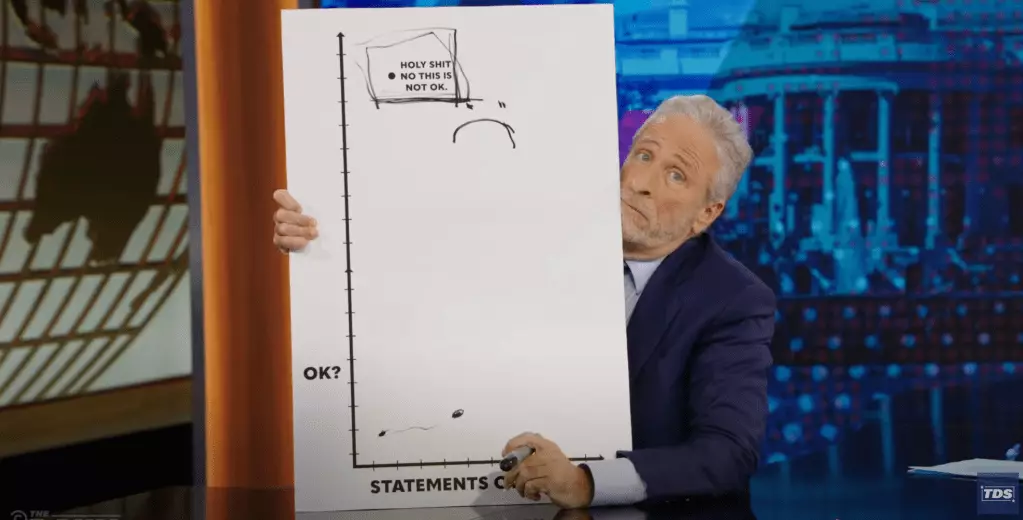In an age where political discourse often feels like navigating a minefield, Jon Stewart, the veteran satirist, presents a unique framework for gauging reactions to Donald Trump’s barrage of controversial statements. During a recent segment of *The Daily Show*, Stewart introduced a chart specifically designed to clarify which issues warrant genuine concern and which should be dismissed as mere antics. This attempt to rationalize seemingly chaotic presidential behavior is both clever and revealing but reveals inherent shortcomings in the satirical approach to serious governance.
The crux of Stewart’s rationale is impressive: by differentiating between ‘OK’ and ‘not OK’ statements, he aims to empower viewers to allocate their emotional energy wisely amidst the noise. However, the method is not without its pitfalls. For example, as he showcased a variety of Trump’s antics—from the bizarre proposition of reopening Alcatraz as a prison to his AI-generated image as the pope—Stewart found himself unable to adhere to the very framework he created. This contradiction highlights the struggles of political comedians to remain grounded amidst the absurdity of the Trump era.
The Dilemma of Overreaction
Stewart’s self-deprecating recognition of his emotional responses points to a much larger issue within political commentaries: the reactionary culture that people have developed in response to Trump’s words. In an era where political correctness often dictates social reactions, Stewart’s chart strives to establish a sense of proportionality in outrage. Yet, his inability to restrain his own feelings speaks to the difficulty of processing the constant mental overload that comes from the president’s irregular behavior.
Using humorous references from popular culture, such as his nod to the business-based format of *Shark Tank*, Stewart attempts to frame these serious issues in an accessible way. However, one must wonder whether such levity can genuinely coexist with the gravity of the underlying subject matter. Are we, as a society, capable of effectively laughing in the face of a reality that often seems tragic? Stewart’s visible frustration when discussing the impact of Trump’s nonsense on news cycles suggests a growing impatience not just with Trump, but also with society’s consumption of sensational headlines.
The Role of Media in Political Discourse
As the satire unfolds, one cannot help but observe the implications of Stewart’s commentary on media dynamics. When he criticizes MSNBC for taking time to fact-check Trump’s disinformation, it raises a critical conversation about the role of media in political engagement. Stewart’s quip implies that the media is caught in a Sisyphean task of sorting through a deluge of misleading statements while sacrificing substantive discussion for the sake of ‘breaking news’.
This scenario begs the question: Is comedy the only viable outlet left to process the cacophony of political discourse? While humor can be an effective tool for disarming complexity and encouraging dialogue, over-reliance on it may lead to desensitization or, conversely, an atmosphere of perpetual outrage. Stewart’s efforts to categorize the madness may indeed serve as a momentary relief, but they also shine a light on the troubling reality of our current media landscape.
While Jon Stewart’s approach to framing Trump’s many utterances showcases the value of satire in a democratic society, it also raises profound questions about the emotional labor required to engage with politics in a meaningful way, leaving us pondering the balance between laughter and critical engagement.

